Alcoholism in Veterans
Questions About Treatment?
Our knowledgeable team is ready to discuss your situation and options. Your call is confidential with no obligation required.
What Is Alcoholism in Veterans?
Did you know that less than 1% of the U.S. population joins the military? As a volunteer-only organization, the low join rate makes the service a unique experience. Veterans are those who served in the military ranks and were released under honorable circumstances. Unfortunately, the high stress levels of the lifestyle can lead to emotional isolation for veterans. In some cases, the stress of military service can also lead to substance abuse, and understanding alcoholism in veterans is vital in order to find a solution.
Veteran alcohol abuse refers to the trend of alcohol use in current and past service members. The condition occurs more frequently in veterans than in other professions, although similar dependency rates can be found in parallel professions such as police work, first responders, and firefighting. Unfortunately, the rate of alcoholism in veterans is on the rise.
Soldiers and Alcoholism
There is no singular reason for alcoholism stemming from military service. The most considered cause is due to war trauma, such as witnessing or experiencing severe injury or death. While it is true that war traumas do make up a significant portion of veterans, it is essential to remember that not every veteran goes to war. Depending on a service member’s specific job, the needs of the organization, and other factors, many service members serve in auxiliary, non-combat roles – even when deployed.1
However, even without direct traumatic experiences, the military is a stressful environment. The high-stress nature of the profession is another leading factor in alcohol dependency. The drinking culture permeated throughout the military is another important factor. Some service members may choose to spend their downtown drinking.1
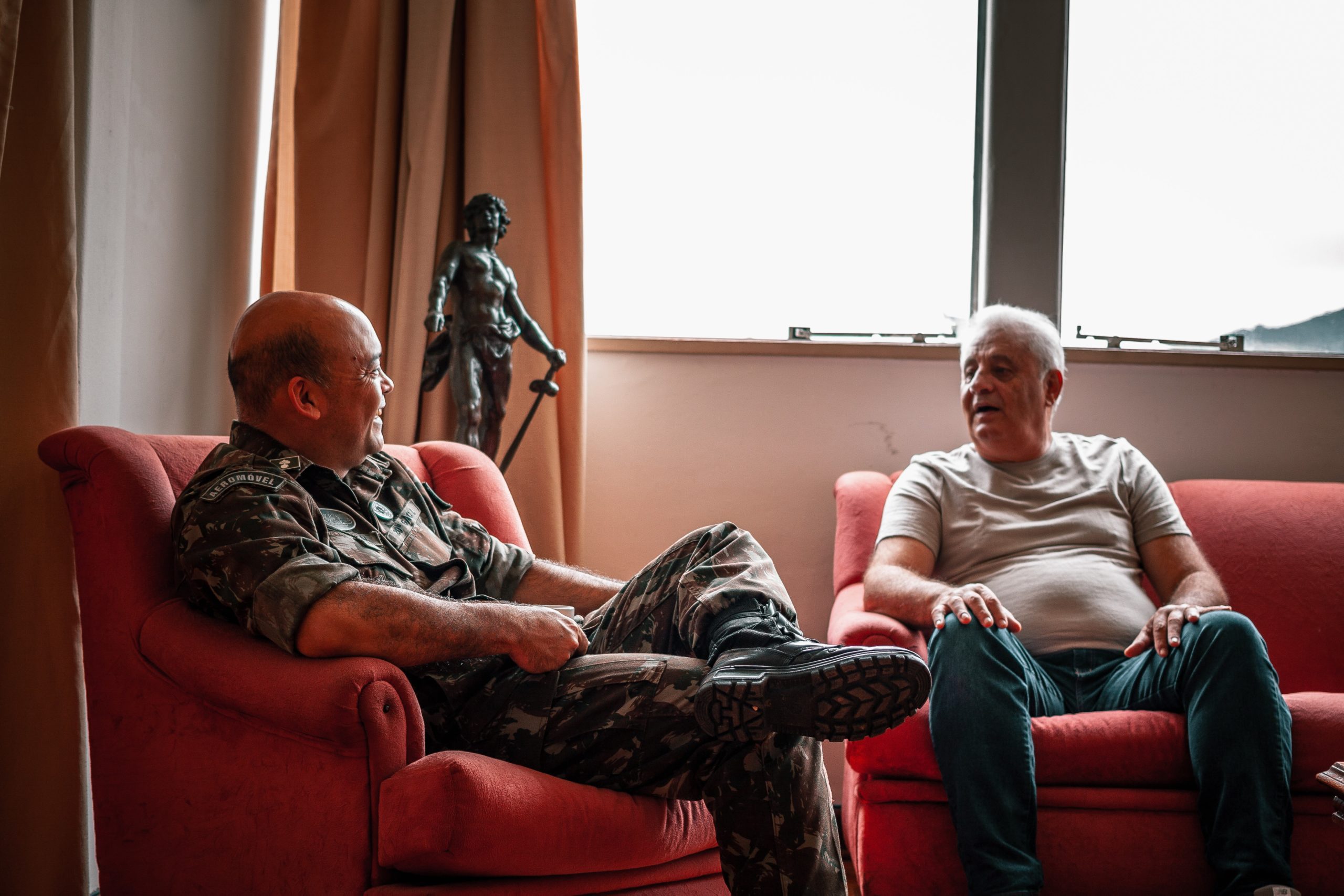
Is Alcoholism A Problem in the Military?
Truth be told, alcoholism is a problem everywhere. That said, alcoholism is on the rise among service members due to the aforementioned factors and other variables. The military has several alcoholism treatment programs set up to treat alcoholism. And individuals found guilty of alcohol-related crimes such as DUI’s or public intoxication are assigned to said treatment programs.
Alcoholism In Veterans Statistics
The National Institution on Drug Abuse has reported the following statistics when it comes to substance abuse in veterans:1
- Approximately 57% of veterans admit to heavy drinking in a rolling thirty-day period.
- 11% of Veterans suffer from severe substance use disorder, although the number is likely much higher due to some veterans never seeking help.
- Almost 50% of OEF veterans are diagnosed with mental health issues.
- 63% of veterans with SUDS also suffer from PTSD
- 5.8% of female veterans also engage in binge drinking, although that number only counts those that have sought medication for alcoholism.2
- Unfortunately, approximately twenty veterans commit suicide every day due to these conditions.2
Causes And Side Effects of Alcoholism in Veterans
Veterans face a bevy of challenges when ending active duty. The time to transition fully into civilian life varies from person to person. Alcohol, however, is not the least of their worries. Some of the causes of alcoholism in veterans include war trauma, stress, the long periods away from loved ones, and the drinking culture in the military.
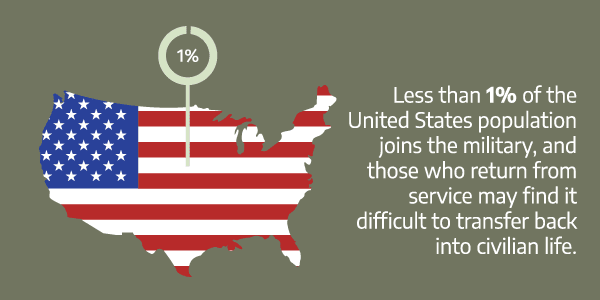
Alcoholism Side Effects
Alcoholism comes with unavoidable side effects. It’s important to remember that even in moderation, alcohol comes with risks. When abused, these risks compound – here are the most common.3
A Discussion of Treatment for Veterans
Common Side Effects
Common side effects of alcoholism include:
- Sleep Issues: Alcohol interferes with one’s natural sleep cycle; this issue can lead to insomnia, restless sleep, and nightmares. Sleep is essential, and without it, the body becomes more likely to develop illness, injury, and mental instability.
- Mood Disorders: Mood disorders like depression, anxiety, and more are made worse by alcohol. Individuals with underlying mood disorders are more susceptible to these effects.
- Incontinence: Alcohol wreaks havoc on the digestive system. In addition, it can cause liver and kidney pain when drunk in excess. Alcohol erodes the digestive lining and causes gas from mixing with stomach acid and certain other foods. The result? Frequent trips to the bathroom.
- Legal Issues: Legal issues include DUI’s, public intoxication charges, fights, and other incidents caused due to poor judgment.
Severe Side Effects
Severe side effects of alcohol include long-term symptoms such as:3
- Brain damage: Brain damage from alcoholism occurs from an increase in harmful brain chemicals.
- Heart Damage: Drinking causes long-term heart damage due to a combination of allowing dangerous toxins into the heart, disrupting heart rhythm, and more.
- Chest Pain: Chest pain can be caused due to heart or lung issues and may become more apparent when coughing or laughing.
- Negative Ideation: Alcohol causes an overproduction of stress hormones which in turn lead to negative thought patterns. Over time, this type of thinking can lead to clinical depression and anxiety.
- Loss of Rank: In the military, serious offenses like DUI’s are punished by losing rank. Loss of rank also includes loss of pay, change of duty station and can even result in the forfeit of benefits for post-military life. Veterans may carry the shame of losing rank with them when they leave the military which in turn may reinforce their drinking habits.
- Unable to promote: The military is a place where fitness is paramount to most other attributes. Alcohol can severely dampen one’s ability to perform well in long runs, hikes, and other training, especially when combined with start times of 3:00 to 5:00 am.
- Inhibited Sex Drive: Alcohol reduces the sex drive and can make men impotent.
Risk Factors
The risk factors for alcohol, especially in a military environment, far outweigh the benefits. Suffering from veterans’ alcohol abuse can make deployments particularly stressful as there is little to no alcohol in or around combat zones.
Another major risk of alcoholism is the withdrawal stage. Should alcoholism in veterans progress to life-threatening levels, then the withdrawal stage can be deadly. Alcohol is one of the few substances that can be deadly when withdrawal hits.
While every drug withdrawal comes with complications, alcohol withdrawal can cause the brain and body to shut down. This aspect is one of the main reasons that combating severe alcoholism must be done in a medical or inpatient environment.
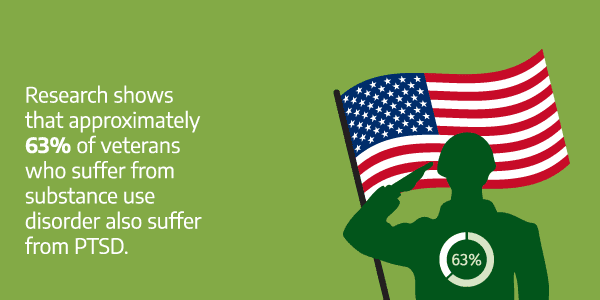
Signs of Alcoholism in Veterans
Signs and symptoms of alcoholism are not always noticeable right away. Over time, however, it can become more difficult to hide the signs.
Symptoms of alcohol abuse in veterans include liver pain, delayed reaction times, agitated mental states, and sleep issues. Veterans that do not suffer from PTSD may still use alcohol to cope with the transition into civilian life.
Symptoms Of Alcoholism in Veterans With PTSD
When it comes to alcoholism in war veterans, the most significant concern is one’s mental state. Alcohol makes it almost impossible to process trauma. Moreover, in combat veterans, it may cause violent outbursts.
With these traumatic and unique experiences, adjusting to being a parent or spouse may become all the more difficult. Alcoholism in war veterans is often due to their trauma. However, it can worsen should the person have underlying conditions or a genetic disposition to dependency. Remember as well that not every veteran gets PTSD directly from combat experiences.
For example, a radio operator that’s removed from the battle may develop PTSD from routinely hearing about the injuries happening not far away. Some veterans assume that they cannot develop PTSD as they were not in direct combat, but this belief makes it all the more difficult for them to receive the proper help.
Stages of Alcoholism in Veterans
The following stages are how veterans’ alcohol abuse progresses over time.
Early Alcoholism
The first stage of veterans’ alcohol abuse begins when a person frequently drinks and does so as a means of escaping reality. Additionally, they begin to require more and more alcohol to get drunk. The shift from social drinking to early-stage alcoholism is subtle.
A person may not realize that it takes them a drink or two more to achieve their desired high. It is also why veterans and other drinking cultures may not even realize that alcoholism has set in. In a drinking culture, being able to drink for long periods or outdrink someone is widely praised.4
Middle Alcoholism
This stage of alcoholism is defined by what happens when a person does not have a drink. When they are not drinking, they will be irritable and often think of the next time they can drink. They will begin to become increasingly unreliable, vanish for long periods, and spend less and less time doing their hobbies.
Once a person reaches middle-stage alcoholism, they will need treatment and therapy to prevent the disease from moving forward. A critical misstep in this stage and the first stage is the assumption that they can stop drinking whenever they want. Because of this belief, they may forgo drinking for a short duration of a month or less but then start back up as if they never stopped. This behavior can lead to the delusion of control but in the grand scheme of alcoholism, not drinking for one month or so out of twelve does little to slow the progression of the disease. In the middle stage, alcoholism becomes apparent to the family and friends, and hangovers will be far more frequent.4
End-Stage Alcoholism
The final stage of veterans’ alcohol abuse is marked by the inability to cease drinking. In this stage, dependency is apparent to everyone in a person’s life. A person with alcoholism this severe will have discolorations around their eyes and skin, they will often appear disheveled and have a hard time expressing coherent thoughts.
Such an individual will also, whenever given the chance, drink for hours on end every day. Some people may begin drinking early in the day or during breakfast, others may stay up all night drinking, and others still may drink consistently throughout the day. To hide their drinking, they will put alcohol into soda bottles, coffee, and other non-alcoholic substances.
In this stage and the middle stage, the individual may make claims that they are better with alcohol and say things like, “I drive better when I’m drunk.” or “It’s just a sip to take the edge off.” End-stage alcoholism also comes with several long-term health complications. A person requires immediate medical assistance when quitting alcohol, as end-stage withdrawal can be deadly.4
A Discussion on Addiction and Veteran
Treatment Options for Alcoholism in Veterans
Treating alcoholism in veterans and the civilian population requires not just medication but also the learning of healthy coping mechanisms. It is essential for recovery that the entire viewpoint, habits, and environment of a veteran to prevent relapse.
Alcohol, unlike many other harmful substances, is so widely available that should unmanageable cravings occur the substance is never far off. Keep in mind as well that many people recovering from alcohol abuse and who have been sober for years still report cravings from time to time.
This fact means that for many, the road to recovery is lifelong. Another major factor in recovery is the person’s want and commitment to the program. These are the go-to methods for treating alcoholism in veterans.
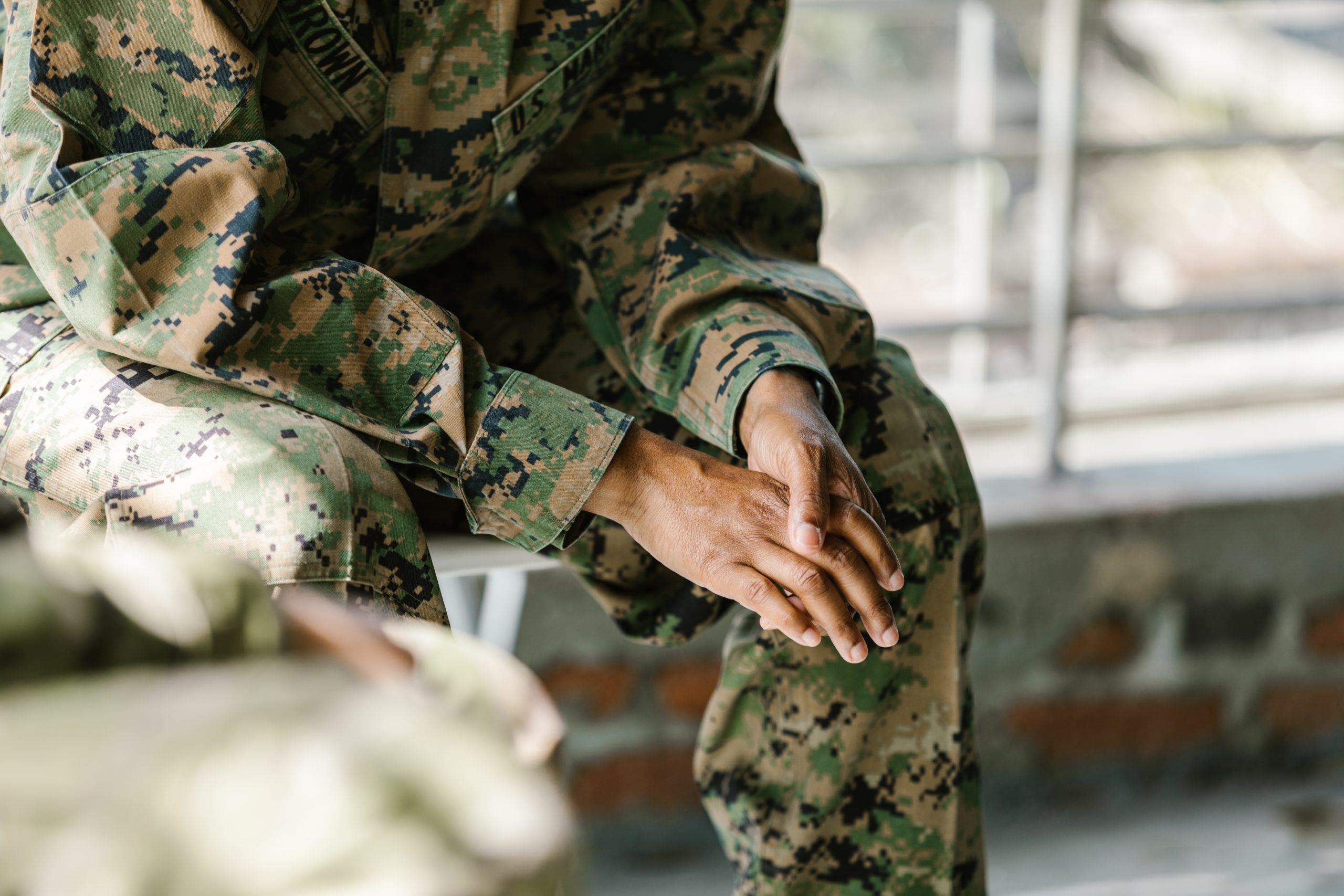
Medications
Alcoholism medication is prescribed to help curb cravings and manage late-stage withdrawal symptoms.
Inpatient Rehab
Inpatient rehab involves staying in a medical and drug rehab facility. It works by immersing patients in treatment. The level of a veterans’ alcohol abuse can dictate which treatment works best for them. Any veteran alcohol rehab will be equipped to deal with the unique stressors that come with veterans and their families. Inpatient is a perfect chance to remove a veteran from their direct surroundings and allow them time to heal in a safe environment.
Outpatient Rehab
Outpatient involves routinely visiting a facility to discuss treatment plans, monitor vitals, and provide support all while allowing a client time to manage their day-to-day lives. Alcohol rehab for veterans works the same.
Support Groups
Support groups like A.A. help prove that overcoming dependency is possible. In terms of veterans, support groups are essential for sharing thoughts and feelings that may only make sense to other service members.
Family Counseling
Family counseling is about education and creating an at-home support system. It can help dispel a lot of myths surrounding dependency. Veterans’ alcohol rehab will also help give families of vets a clearer understanding of what the military and deployment are like.
Continuing Care Programs
Continuing care programs help establish a long-term treatment plan. Overcoming dependency is a life-long journey, maintaining a healthy support system is important.
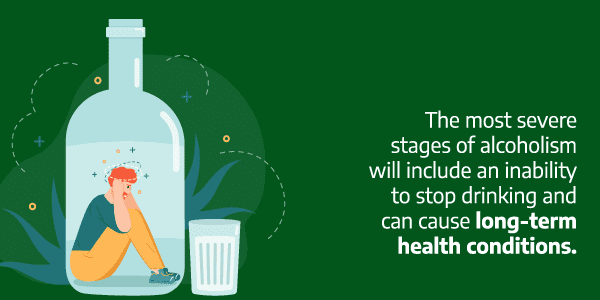
Treatment for Alcoholism in Veterans Near Houston
Great Oaks Recovery Center has options for veterans and their families that suffer from dependency and mental illness.
Great Oaks’ Tactical Recovery Program
Great Oaks Recovery Center offers a Tactical Recovery program build specifically to meet the needs of veterans. This program helps clients overcome alcohol abuse, drug abuse, and co-occurring PTSD symptoms. Our Tactical Recovery program is individualized to meet each veteran wherever they are in their recovery journey. Moreover, our staff understands that there is no one-size-fits-all approach to long-term care.
The Tactical Recovery program is led by staff members who are trained to specialize in veteran care. It is centered on empowering clients and helping them move towards a life of healing and recovery.
At Great Oaks Recovery Center, we also help with family counseling so that a client’s loved ones can learn about substance abuse and the treatment process. We are leaders in our field because every member of our staff is dedicated to helping veterans regain control of their life and discover the path to healing.
Get Help Today
To learn more about Great Oaks Recovery Center’s Tactical Recovery program, reach out to us today. A member of our staff would be happy to discuss the next steps with you.
Resources
- https://www.drugabuse.gov/publications/drugfacts/substance-use-military-life
- https://www.ncbi.nlm.nih.gov/pmc/articles/PMC3945024/
- https://www.ncbi.nlm.nih.gov/pmc/articles/PMC3307043/
- https://onlinelibrary.wiley.com/doi/abs/10.1111/j.1360-0443.1997.tb02882.x
Questions About Treatment?
Our knowledgeable team is ready to discuss your situation and options. Your call is confidential with no obligation required.

